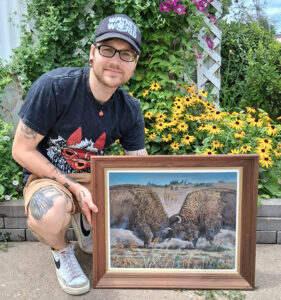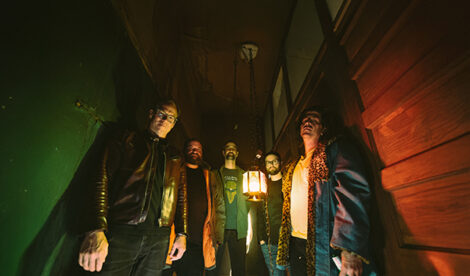Fight for your rights: Two MHS groups, one Miller Middle School individual headed to NHD nationals

T-R PHOTOS BY ROBERT MAHARRY From left to right, Marshalltown High School sophomore Jacob Seberger, senior John Moellers, sophomore Parker Christen, senior Isaac Seberger and senior Isaac Benscoter are headed to the upcoming National History Day (NHD) National Competition along with sophomore Preston Johnson, who is not pictured. Jacob Seberger, Moellers, Christen and Johnson made a documentary about Iowa Governor William Harding’s 1918 Babel Proclamation, while Isaac Seberger and Benscoter did a performance about the Tinker v. Des Moines Supreme Court case.
A passion for history is alive and well within the Marshalltown Community School District (MCSD) — especially among a select group of students who will be headed to the National History Day (NHD) national competition in College Park, Md. from June 8-12 and a teacher who has been nominated to receive a prestigious honor there.
This year, the theme for the annual contest is “Rights and Responsibilities,” and three total Marshalltown entries have advanced to the national level. A group documentary from MHS sophomores Jacob Seberger, Parker Christen and Preston Johnson and senior John Moellers explores Iowa Governor William Harding’s Babel Proclamation issued in 1918, which forbade the speaking of any non-English language in public amidst a surge in anti-German and Dutch sentiment near the end of World War I. Seniors Isaac Seberger and Isaac Benscoter, who advanced to nationals last year with a performance about the Bonus Army, stayed in the same category this year but focused on the Tinker v. Des Moines Supreme Court case, while eighth grader Londyn Senethavysouk created a documentary about the history of Native American boarding schools.
Members of the larger group spoke first about why they were drawn to the Babel Proclamation and the case they made through their project.
“Basically, we argue that it was the immigrants’ responsibility to fight against this law, which was stripping them of their fundamental rights,” Christen said.
A church was burned down in the famously Dutch town of Pella, and German language textbooks were also destroyed.
Jacob Seberger said the group found a lot of letters and conducted a ton of research to accompany their 10-minute documentary, even securing an interview with former Governor and Secretary of Agriculture Tom Vilsack, who signed the English Language Reaffirmation Act in 2002, which requires that all official political documents “shall be in the English language” unless the materials are deemed “necessary to secure the rights guaranteed by the Constitution.” Initially, they went over the time limit but condensed it for the state competition.
“We just ended up taking out lines that we thought didn’t relate as much and just kind of trusted it, and it worked very well,” Moellers said.
The group was selected as an alternate to advance to nationals last year, so they’re excited to step up to “the big leagues.” Benscoter and Isaac Seberger, Jacob’s older brother, said they were looking for topics related to Iowa when they came across the well-known case of a group of Des Moines Public Schools students (four of them siblings with the last name Tinker) whose act of protest against the Vietnam War by wearing black armbands to school went all the way to the Supreme Court.
“Our argument was basically that schools have a responsibility to respect the rights of their students — in this case, First Amendment rights of protest and free speech — even if that’s not the wishes of the administration,” Benscoter said. “A lot of people know this topic, but they don’t know much about it.”
While the basics of the case are generally understood, Isaac Seberger said they attempted to go into more detail about the lengthy history of the controversy surrounding the Vietnam War and the military draft, everything the Tinker family went through and the ruling’s lasting impact on the right to free expression among students with the “substantial disruption” test still utilized by courts today.
“Had the Tinker family and children simply given up after being denied by not one but two courts, students around the country would be experiencing a much different level of freedom today,” Benscoter said. “Without the bravery and the willingness of those Iowans, the country might not have ever begun respecting students and their rights the way we are today. And when you consider that history and its implications on the students’ rights, the impact is clear as day.”
Isaac Seberger added that even now, the case still applies in regards to acts of protest against current wars like the ones in Gaza and Ukraine — or even NHD itself potentially being stripped of federal funding.
Most of the high school NHD exhibitors are involved in other extracurricular activities like sports, but they aren’t any less competitive when it comes to these projects.
“Especially for our two topics, they’re both based in Iowa, which is where we’re growing up right now, and it obviously gives us more of a backstory of how things are happening today and why they came to be and everything, and it’s a great way to grow our knowledge in history and just get smarter,” Jacob Seberger said.
His older brother compared NHD to athletics and likened it to building one’s mind through research, learning to write papers and memorize things as opposed to building the body and teamwork. Moellers said he relished the opportunity to discuss the experience with teachers who had competed in NHD when they were in school.
Benscoter is headed to the national contest for the third time.
“For me, it’s not really an education thing. That’s definitely nice. I’ve learned a lot of new skills, but I’ve also met a lot of new people. I still talk to people from out of state that I met at the national contest in the past two years, and it’s just a lot of memories,” Benscoter said. “Those two weeks I’ve spent at College Park staying on the University of Maryland campus have been probably two of the most fun weeks I’ve had in my life. You meet a lot of people. You do a lot of fun stuff. It’s really stress free. You know that you made it there and you want to do your best, but a large portion of the work is done and you’re kind of just there seeing how far you can go.”
The educator who works with them on their projects, MHS Extended Learning Program (XLP) instructor Susan Fritzell, is also up for the National NHD Teacher of the Year Award after winning the Iowa NHD Teacher of the Year Award in 2024.
“I am honored to receive the nomination, but want to acknowledge my students in helping me get this point. I tell my students that we have a symbiotic relationship. I will work as hard for them as they are willing to work for themselves,” she said. “In the past few years they have aimed high and kept me very busy. It has been a joy to put in so much effort and see my students have so much growth and success.”

Miller Middle School eighth grader Londyn Senethavysouk, left, has advanced to the NHD National Competition for her documentary “Extermination or Civilization: Native American Boarding Schools.” She is pictured with Middle School Extended Learning Program (XLP) Teacher Ann Jackson, right.
At the middle school level, Senethavysouk said her XLP teacher, Ann Jackson, recommended Native American boarding schools as a potential project topic, which immediately caught her attention as she has uncles and cousins who are members of the local Sac and Fox Tribe.
“That’s why I really stuck with it. I wanted to tell their stories, and when I started looking into it, there was so much that I had never heard of about the way these children were treated,” she said.
The most surprising thing she learned in researching her documentary titled “Extermination or Civilization: Native American Boarding Schools,” she added, was the intentional infliction of illness and diseases on the children in hopes that they would return home to their tribes and spread the infection. The boarding schools began as a result of the Civilization Fund Act, also known as the Indian Civilization Act, after it was passed in 1819, and the last boarding school was not closed until 1996. Former President Joe Biden issued a formal apology for the federal government’s role in running the schools in October of 2024.
“I didn’t have a lot of knowledge on this. I kind of have a repertoire of topics that might fit, and then I just throw them out to the kids and see what sticks. And Londyn really grabbed hold of this one,” Jackson said. “I’ve said this many times, but I think what really makes Londyn’s project special is (that) she just became passionate about this project and wanted to learn everything she could about it and really took ownership and took hold of the project. And I think that’s what made her successful.”
Her advice to younger students, she added, is to find topics they possess that level of passion and interest in, as Senethavysouk wanted to share hers at the library and with the Historical Society of Marshall County even if it didn’t advance to nationals. She also reflected on the lessons she took away from her project.
“Just because somebody is different, maybe doesn’t look the same (or) act the same doesn’t mean they’re any less or uncivilized just because they do things differently. You should really get to know somebody before you can make that judgment,” Senethavysouk said. “These boarding schools were started because the Christians and the government thought ‘Hey, they live in these teepee houses made of different materials. They hunt different. They do different things, and therefore they are just not human in the same way that they are.”
She incorporated videos of surviving speakers, news clips and an interview with her uncle, a member of the Sac and Fox Tribe, and she is working with the Meskwaki Tribal Council on a potential sponsorship for her trip to nationals in Maryland. Senethavysouk still hopes to expand on her work and turn it into a full-length documentary in the future, and Jackson suggested entering into the Better Angels Society contest.
To learn more about NHD, visit https://nhd.org/en/contest/national-contest/.
——
Contact Robert Maharry at 641-753-6611 ext. 255 or rmaharry@timesrepublican.com.






